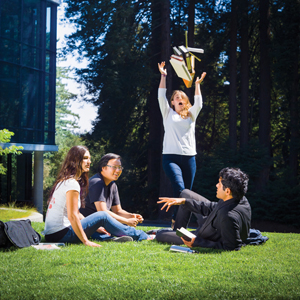Campus News
College evolution
UCSC’s colleges are ground zero for innovation—and they’re home to new programs, fresh initiatives, and bold goals.

(Photo by Elena Zhukova)
|
Those outside the redwood sphere of UC Santa Cruz may be mystified by the familiar Banana Slug question of, “What’s your college?”
To the uninitiated, that query may sound redundant. But if you’re a bona fide Slug, you know that UCSC’s students are part of both a prestigious university and a college— or, to be more specific, one of 10 residential communities that play essential roles in their academic and social experience here.
All undergraduate students, whether they live on campus or not, are affiliated with one of the 10 colleges at UC Santa Cruz. Each college provides academic support, organizes student activities, and sponsors events that enhance the intellectual and social life of the campus in addition to housing students in small-scale communities.
UCSC’s founders created the unique college structure with the intention of combining the intimacy of a small, liberal arts college with the depth and rigor of a major research university.
“A lot of public universities have great research missions, but they’re enormous and end up making you feel anonymous,” said Cowell College Provost Faye Crosby. “You sink or swim, and you may not get that collegiate experience.”
At UCSC, she said, “Each student feels that his or her college is a home, a neighborhood. Students get a feeling of closeness and collegiality, of ownership. This is their place.”
Colleges provide distinct intellectual and cultural environments, each emphasizing in its own way social responsibility, curricular innovation, and connections across the disciplines. The colleges all offer intensive and personalized academic advising; themed core courses; and cultural and curricular programming.
With the support of UCSC’s top leadership, exciting new developments are happening in the colleges.
Undergrads work at grad level
The First Year Honors Program began in fall 2011 at Cowell College to give high-performing frosh the extra-rigorous curriculum they would normally encounter in graduate school, including special courses, seminars, and colloquia.
Since then, Crown College joined the Honors Program, which puts a special emphasis on challenging and immersive learning. One recent example: in a course offered through Crown, 15 freshmen set off on a quest to find viruses lurking in extreme saline environments. Under the guidance of biomolecular engineer David Bernick, the students in Extreme Environmental Virology got a taste of the South Bay Salt Water Ponds as well as graduate-level research.
Since then, Kresge, Stevenson, and Merrill colleges joined the Challenge Program, another program geared toward intellectually ambitious students and including classes, presentations, and research opportunities.
Both the Honors and Challenge programs include close interactions between UCSC faculty and academically motivated peers in classes, social settings, and collaborative projects.
Community studies returns
Oakes College now hosts the revived community studies major, which was suspended in 2010 because of budget cuts. Back and accepting new students, the program is a perfect match for a college with Oakes’s multicultural community and strong commitment to social justice, said college Provost Kimberly Lau.
The major, founded in 1969, integrates experiential education—a six-month, full-time field study—with campus-based classroom learning.
Each year, the program will accept up to 70 new undergraduate students who will take courses in the social sciences and humanities along with the community studies core curriculum based at Oakes.
This arrangement, Lau said, “will help Oakes tremendously” because the collaboration also allows Oakes to offer a certificate in Service Learning and Community Justice. Leslie Lopez, the lecturer who teaches the Intro to Community Studies course, will direct the program and develop a range of courses that ground service learning experiences in an academic context to help students understand the social, political, and historical factors shaping today’s world.
Community studies has more than 1,000 alumni, including 100 who have founded public service nonprofits, most of them in California. Hundreds of others lead nonprofits or serve on their boards of directors.
Merrill field-study program resurfaces
Merrill College, with its activist learning focus, shuttered its extensive field-study program 20 years ago, after 25 years of local, regional, and international impact and learning. Now the program is back—but don’t mistake its return as a nostalgic gesture, said Merrill Provost Elizabeth Abrams, who calls it “an important and relevant revival, designed for students dealing with the circumstances of today.”
Building on an existing school placement program, Classroom Connections, the new program will blend service with experiential learning. The field-study program, which will launch in spring 2014, is accumulating a range of internship opportunities, starting with local and regional and building toward international placements, while Classroom Connections specializes in educational internships, placing Merrill students in public elementary and high school classrooms in several California communities.
Through a new partnership with nearby Pescadero, undergraduates will assist in high school classrooms and help run enrichment programs for the mostly bilingual, Latino, and bicultural students. In such programs, “a little money goes a very long way,” Abrams said. For instance, it costs only $5,000 to put 48 UCSC students in Pescadero classrooms for the year, with most of the money going toward transportation.
Merrill is also starting new peer-mentoring programs that provide work-study jobs for students, and a cross-generational mentoring program that brings alumni, emeriti, and former staff back to the college to support Merrill students finding their way at UCSC.